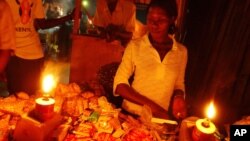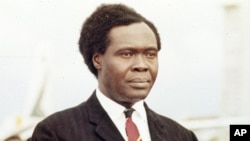KAMPALA —
October 9 marks the 50th anniversary of Uganda's independence, an event the government is celebrating with great fanfare. In 1962 Ugandans had high expectations of their new nation. But not many of those expectations have been realized.
On the day Uganda was granted independence from Britain - October 9, 1962 - Denis Kazibwe’s father planted a tree. “A tree for independence. That was the first time we were served bread and tea with milk, and all of us got excited,” said Kazibwe.
Kazibwe was only nine years old at the time, a primary school student in central Uganda. But he remembers the atmosphere of euphoria and hope that permeated the new nation.
“The people thought that with independence, things would improve through all sectors. People would get jobs, life would be better, schools would be better. They were expecting quite a lot,” he said.
This Tuesday, Uganda is celebrating its 50th anniversary as an independent state. The event is being marked in Kampala with concerts, speeches and exhibitions. But not everyone is jubilant, as Ugandans look back at the turmoil of the last half-century, and contemplate how much remains to be achieved.
Mwambusya Ndebesa, a history professor at Kampala’s Makarere University, says that at the time of independence, Ugandans expected dramatic political reform.
“They expected to be more democratic and enjoy [more] freedoms than under colonial rule," said the professor. "They expected to be controlling their economy and their politics. But alas, they have found that citizens’ control of those in power, in certain respects, is as it was in the colonial period.”
Political trouble
As Ndebesa points out, political trouble began less than a year after independence. Things came to a head four years later, when then-Prime Minister Milton Obote suspended the constitution and seized all power for himself. What followed was a succession of military takeovers ending with the current president, Yoweri Museveni, whose rule is seen by many as increasingly autocratic.
Ugandans have never truly been in control of their government, says Ndebesa.
Another problem, he adds, is that although independence created a legal state, it failed to build the nation-state needed to forge a common identity.
“Ugandans do not have much in common. And that explains why most Ugandans do not identify themselves with each other and with the Ugandan state. Ugandans still primarily identify themselves with their ethnic groups. People do not identify with their national symbols or the constitution,” said Ndebesa.
Back in 1962, says Lawrence Bategeka of the Economic Policy Research Center, the new government’s intentions were good. Policymakers of those days were determined to improve the lives of all Uganda’s people, he says.
What went wrong
“The government of the day that came into power was very excited. The desire was that government would provide everything, it will run public enterprises, and that’s where it went wrong,” said Bategeka.
What went wrong, Bategeka says, is that like many other new African states, Uganda embraced socialist policies without the financing to back them up. He says this goes a long way toward explaining the wealth disparity today between Uganda and its relatively prosperous neighbor, Kenya.
“Kenya did not assume socialist policies. That persuasion of adopting socialism partly explains the stagnation of sub-Saharan African countries. Those that did not stifle the private sector, like Kenya, have done relatively better,” said Bategeka.
Economic outlook
Which is not to say that Uganda’s economic outlook is gloomy. The past decade has seen robust growth, averaging over seven percent a year, according to Bategeka. Uganda has also recently discovered oil.
But, as Bategeka points out, not everyone has benefitted from the boom years.
“It was driven mainly by services and construction," he said. "And agriculture, which employs the majority of the people, grew dismally, sometimes negatively. So the growth has not been equitably distributed. Income inequality has widened between income groups, and also between regions.”
Denis Kazibwe, now 59, agrees. Life in his village, he says, has not improved much over the past 50 years. Earlier this year, he took his son back to visit his old primary school, and was saddened by what he saw.
“That primary school is even worse than what it used to be in 1962," said Kazibwe. "You know, we used to go to school barefooted. Now when I visited that place again, the pupils were still barefooted. They don’t have electricity. I would say that in the area, people are even poorer than what we used to be. It’s a very, very big disappointment.”
The tree his father planted is still there. But his village’s optimism, Kazibwe says, died off long ago.
On the day Uganda was granted independence from Britain - October 9, 1962 - Denis Kazibwe’s father planted a tree. “A tree for independence. That was the first time we were served bread and tea with milk, and all of us got excited,” said Kazibwe.
Kazibwe was only nine years old at the time, a primary school student in central Uganda. But he remembers the atmosphere of euphoria and hope that permeated the new nation.
“The people thought that with independence, things would improve through all sectors. People would get jobs, life would be better, schools would be better. They were expecting quite a lot,” he said.
This Tuesday, Uganda is celebrating its 50th anniversary as an independent state. The event is being marked in Kampala with concerts, speeches and exhibitions. But not everyone is jubilant, as Ugandans look back at the turmoil of the last half-century, and contemplate how much remains to be achieved.
Mwambusya Ndebesa, a history professor at Kampala’s Makarere University, says that at the time of independence, Ugandans expected dramatic political reform.
“They expected to be more democratic and enjoy [more] freedoms than under colonial rule," said the professor. "They expected to be controlling their economy and their politics. But alas, they have found that citizens’ control of those in power, in certain respects, is as it was in the colonial period.”
Political trouble
As Ndebesa points out, political trouble began less than a year after independence. Things came to a head four years later, when then-Prime Minister Milton Obote suspended the constitution and seized all power for himself. What followed was a succession of military takeovers ending with the current president, Yoweri Museveni, whose rule is seen by many as increasingly autocratic.
Ugandans have never truly been in control of their government, says Ndebesa.
Another problem, he adds, is that although independence created a legal state, it failed to build the nation-state needed to forge a common identity.
“Ugandans do not have much in common. And that explains why most Ugandans do not identify themselves with each other and with the Ugandan state. Ugandans still primarily identify themselves with their ethnic groups. People do not identify with their national symbols or the constitution,” said Ndebesa.
Back in 1962, says Lawrence Bategeka of the Economic Policy Research Center, the new government’s intentions were good. Policymakers of those days were determined to improve the lives of all Uganda’s people, he says.
What went wrong
“The government of the day that came into power was very excited. The desire was that government would provide everything, it will run public enterprises, and that’s where it went wrong,” said Bategeka.
What went wrong, Bategeka says, is that like many other new African states, Uganda embraced socialist policies without the financing to back them up. He says this goes a long way toward explaining the wealth disparity today between Uganda and its relatively prosperous neighbor, Kenya.
“Kenya did not assume socialist policies. That persuasion of adopting socialism partly explains the stagnation of sub-Saharan African countries. Those that did not stifle the private sector, like Kenya, have done relatively better,” said Bategeka.
Economic outlook
Which is not to say that Uganda’s economic outlook is gloomy. The past decade has seen robust growth, averaging over seven percent a year, according to Bategeka. Uganda has also recently discovered oil.
But, as Bategeka points out, not everyone has benefitted from the boom years.
“It was driven mainly by services and construction," he said. "And agriculture, which employs the majority of the people, grew dismally, sometimes negatively. So the growth has not been equitably distributed. Income inequality has widened between income groups, and also between regions.”
Denis Kazibwe, now 59, agrees. Life in his village, he says, has not improved much over the past 50 years. Earlier this year, he took his son back to visit his old primary school, and was saddened by what he saw.
“That primary school is even worse than what it used to be in 1962," said Kazibwe. "You know, we used to go to school barefooted. Now when I visited that place again, the pupils were still barefooted. They don’t have electricity. I would say that in the area, people are even poorer than what we used to be. It’s a very, very big disappointment.”
The tree his father planted is still there. But his village’s optimism, Kazibwe says, died off long ago.





